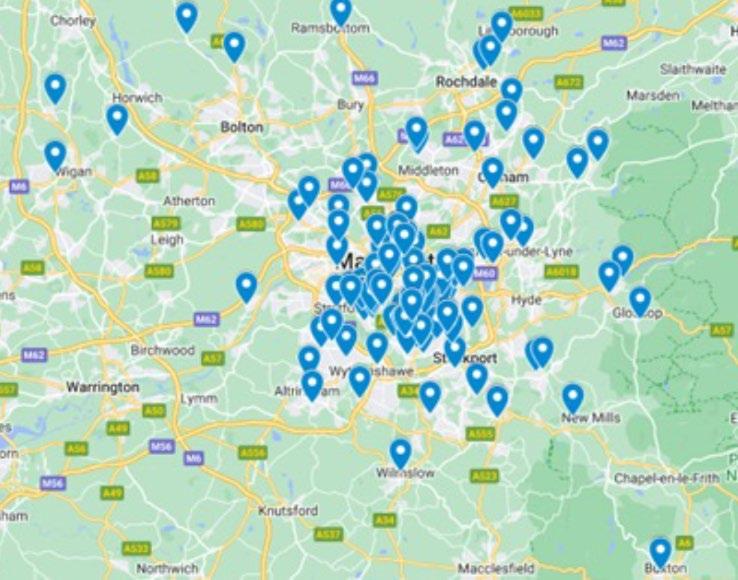
4 minute read
Festival Activity
Figure 1
Postcode distribution of feedback responses
Visitor Demographics
Most respondents to the survey live in and around central Manchester (122), followed by Stockport (28), Salford (16), Oldham (15), and Trafford (15). Other areas of Greater Manchester were identified in the forms including Bolton, Bury, Wigan, Tameside, and Rochdale. Mapping postcode data also indicates that the festival reached audiences beyond Manchester including Birmingham and Southern Ireland.
To understand the diversity of the audiences of this year’s festival, visitors were invited to identify their age, ethnicity, and gender on the survey. As shown in Figure 3, the vast majority of visitors were 60 and over (99 out of 231), and there is a downward trend as the age category is lowered, with only 2 visitors who filled out feedback forms identifying themselves as under 20 years of age.
According to 2021 census data, the highest count age category in Greater Manchester is the age 30 to 34, which suggests that the festival is failing to engage with the largest part of the region’s population.
Similarly, 78% respondents to the feedback form identified themselves as White British (Figure 4), with the remaining 22% being mostly European (10%), Asian (6%), with 1% identifying themselves as Black or Mixed Heritage and less than 1% as Hispanic. These findings suggest that the festival has started to attract a more diverse audience but there is still some homogeneity.
In recent years, gender has become a more diverse and complex category and to address this the gender question on the survey consists of a box for respondents to provide their own description of their gender. This returned with 48% respondents identifying themselves as female, 33% as male, 18% unknown, and 1% queer (Figure 5).
Of the respondents to the survey, 25 noted that they are disabled, which is attributed to 10% of all responses. Recent data indicates that 23% of the population in the North West are classed as having a disability, therefore the data from feedback forms suggests that more could be done to support those with disabilities to attend the event.
Visitor Experiences:
Overall, visitors were shown to have enjoyed the festival with nearly 99% of respondents rating the festival either Excellent, Very Good, or Good and over half of responses noted that they would definitely attend another event (Figure 6).
The events of the festival also had an effect on visitors. 63% of visitors noted that they felt inspired, and over 50% noted that the event that they had attended made them consider climate change in a different way. Whilst some of these responses highlighted a recognition of the more negative or gloomy aspects of climate change:
I didn’t realise how bad it’s become […] Action is required faster than we think.
Audience Member, Feedback Form.
Others responded with a more positive outlook and a want to make a change:
No action is too small’ […] I feel more people are coming on board’ […] It has impressed on me the importance of needing change.
Audience Member, Feedback Form.
This is also evident in the data as 72% of visitors said that they would like to take some form of action out of concern for climate change following the event they had attended with a further 10% noting they will continue with their climate awareness action (Figure 7). These actions include eating less meat by taking on a vegetarian diet, using less plastic, using more public transport, and cycling to places as opposed to using a car. Many also highlighted a desire to go out and learn more about the subject and one respondent noted how they would use the information learnt to discuss with others in future debates. One primary teacher even noted how they felt inspired to implement climate education with the children they teach:
It has certainly given us pause for thought about our buying habits when it comes to food, and also provided useful and informed material/information that can be used/ referenced in future debates.
Audience Member, Feedback Form.
As a primary school teacher, I feel inspired to implement education and change with the children.
Audience Member, Feedback Form.
These responses highlight how the festival has supported both raising awareness and encouraged people to take action on climate change. Many respondents also acknowledged the historical and climate change connections evident throughout the festival, which indicates that the festival has been successful in using history to explore and raises awareness around the themes of climate change:
Has attending this event made you think about climate change in a different way? Yes, how local history has affected it […] Yes, the historical influences on today’s climate, social and vegetation […] Interesting to think about how the North and its resources were the origins of climate change.
Audience Member, Feedback Form.







